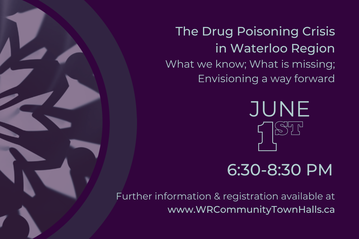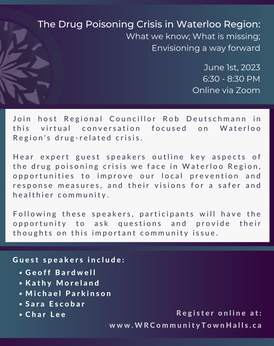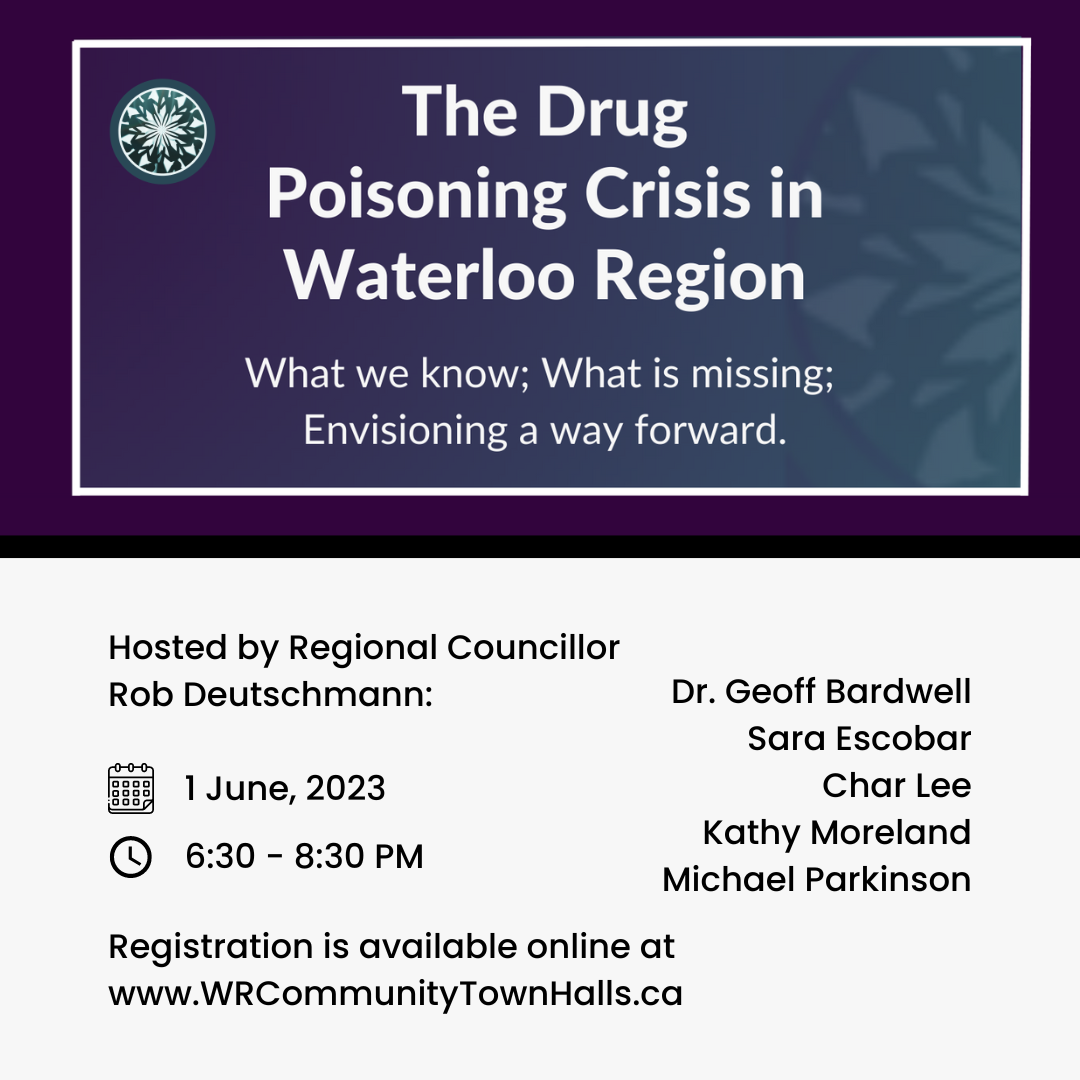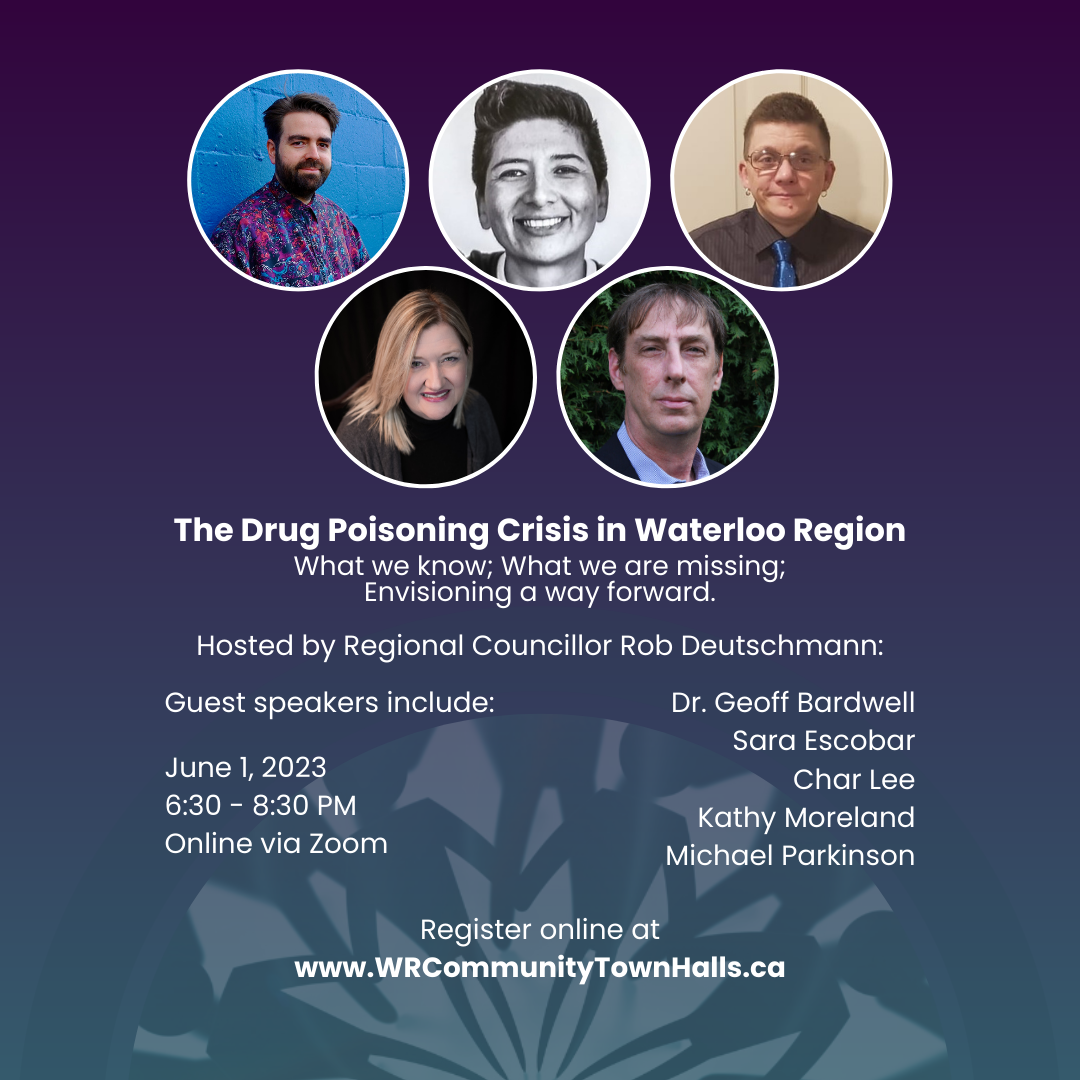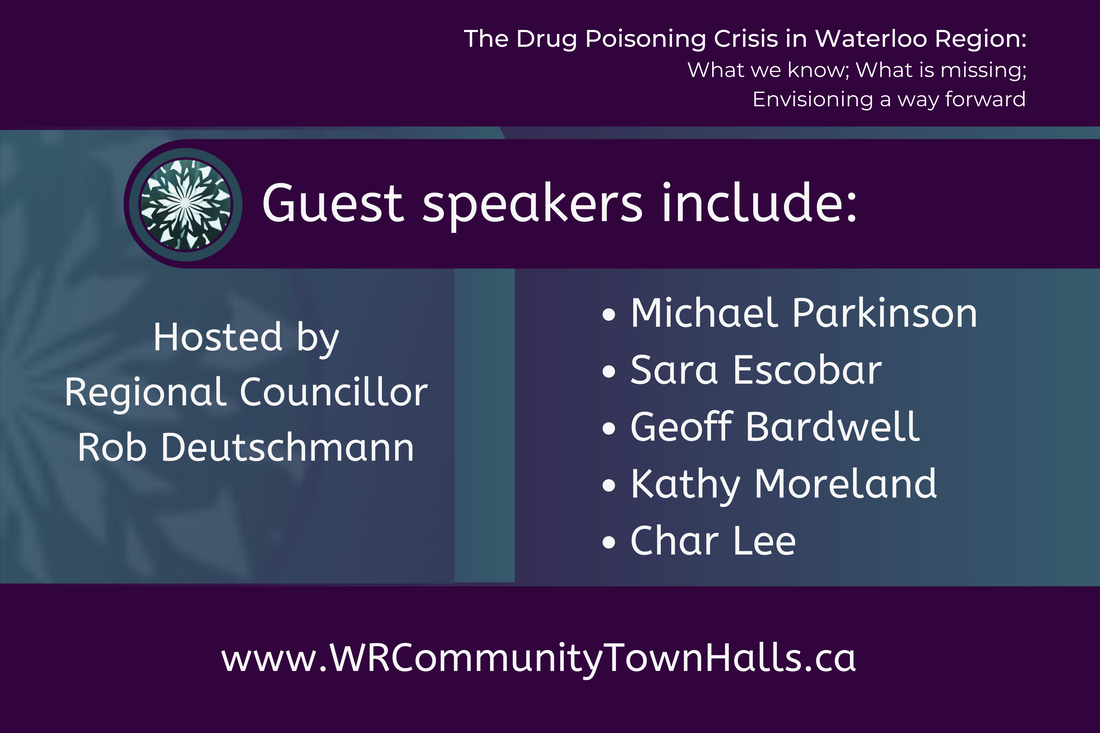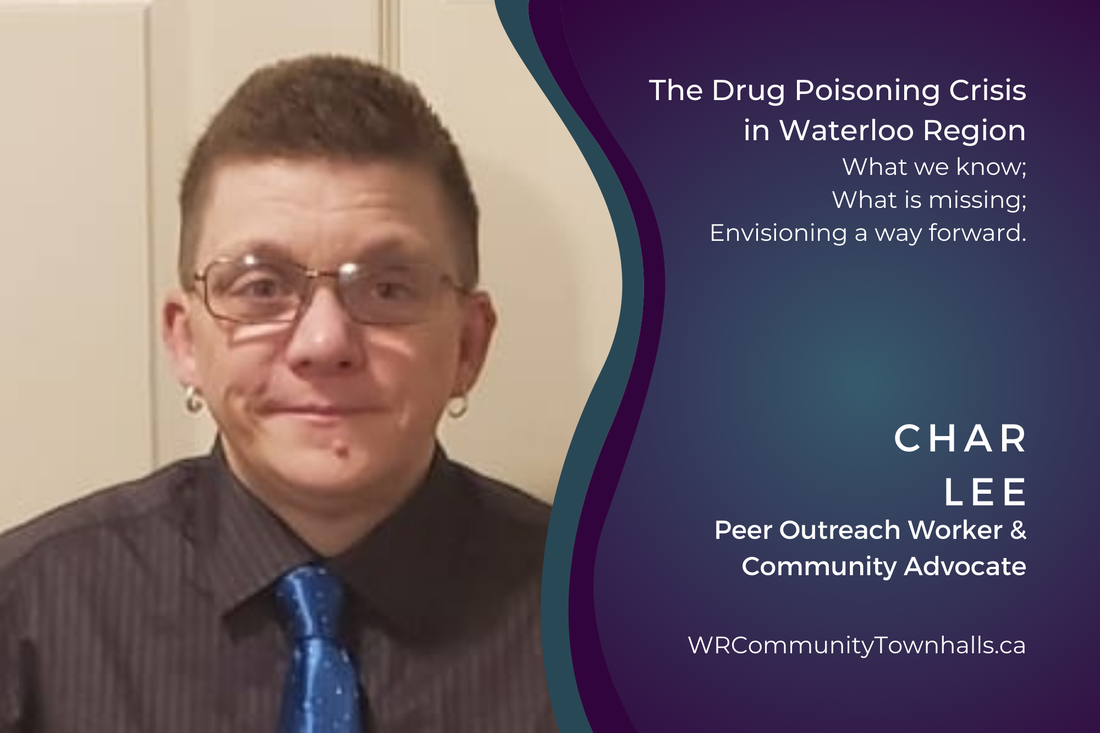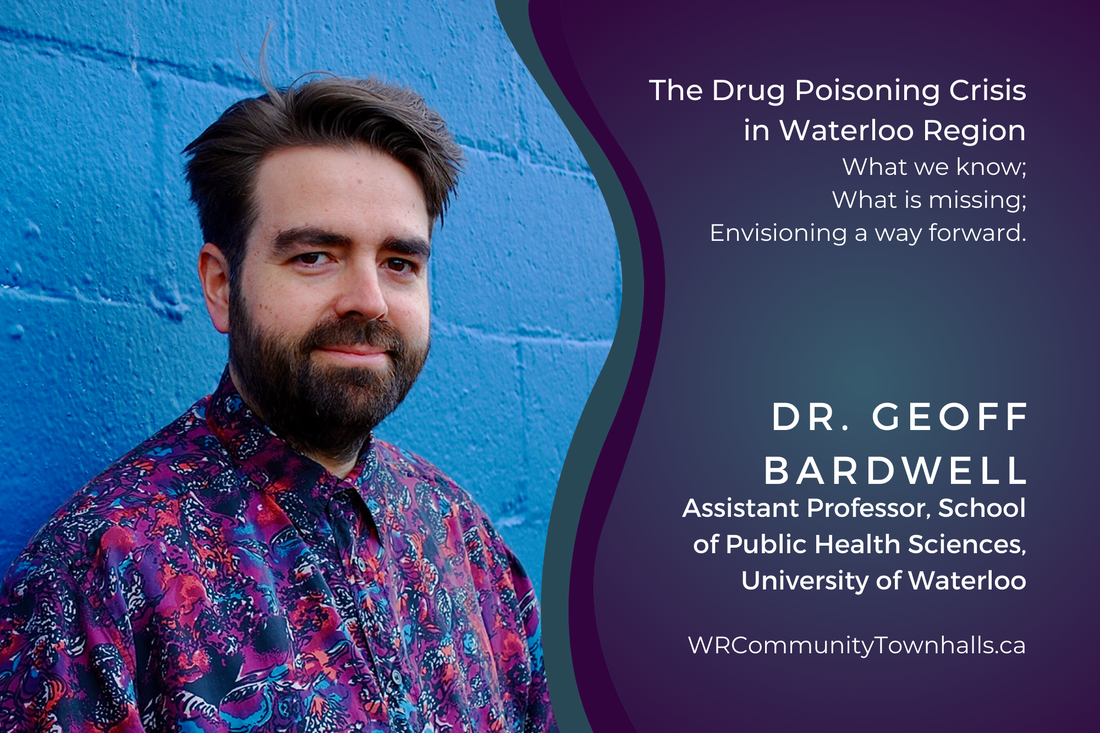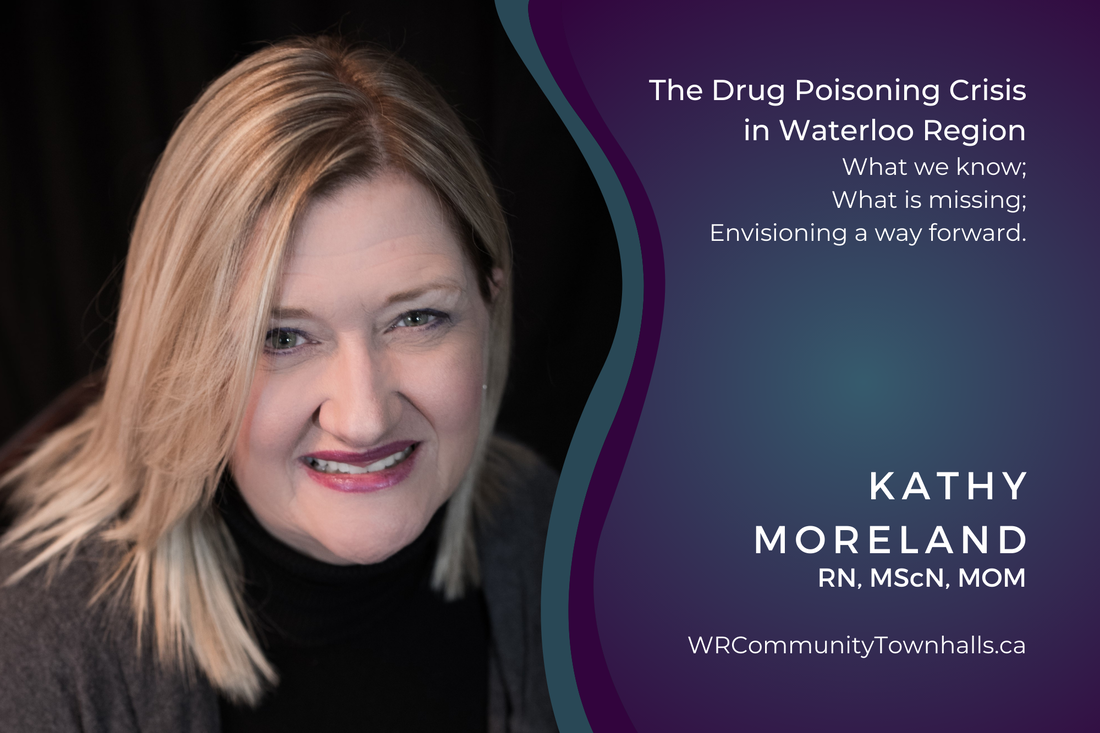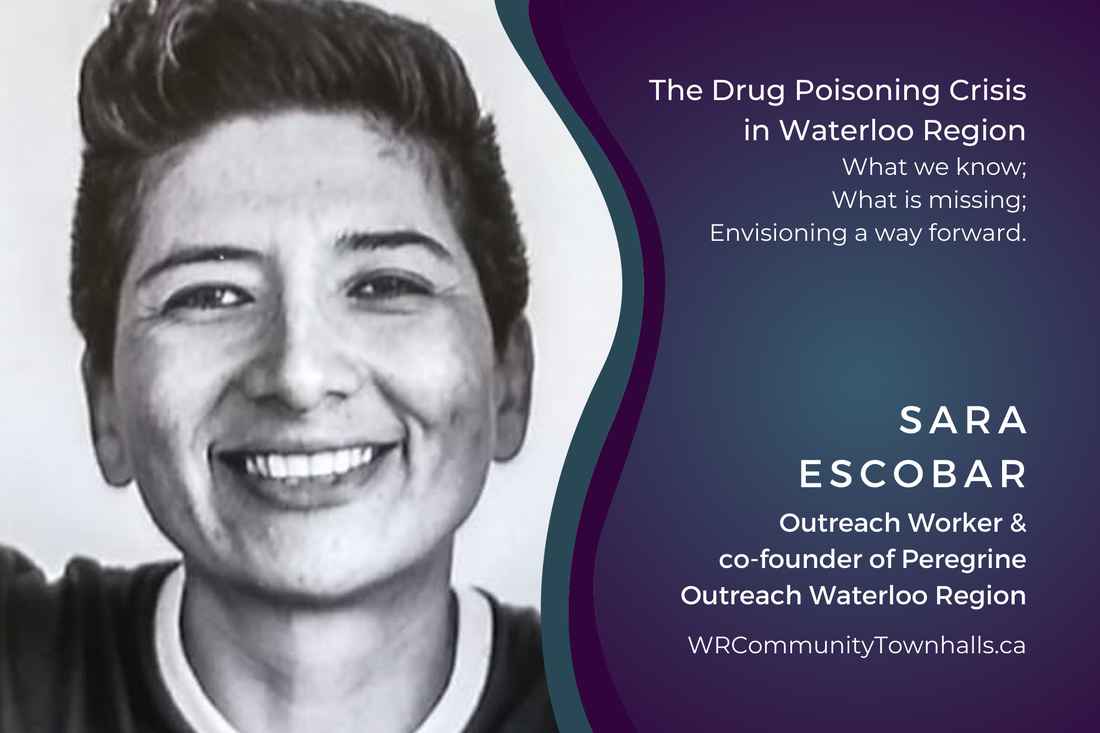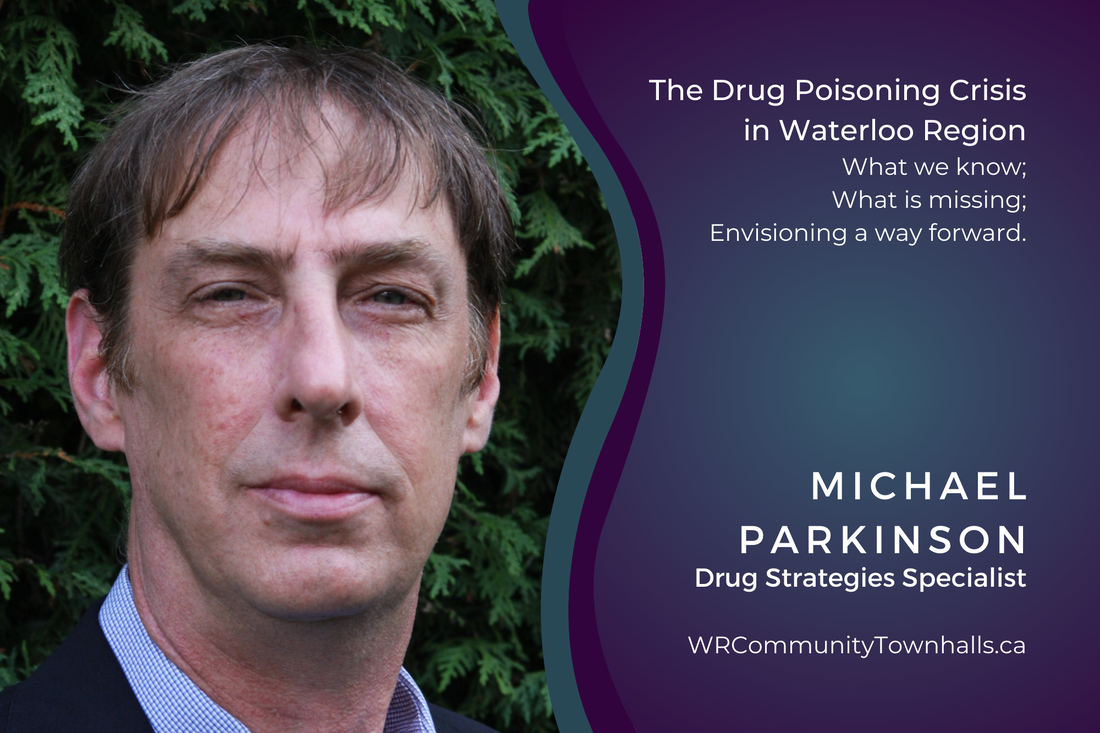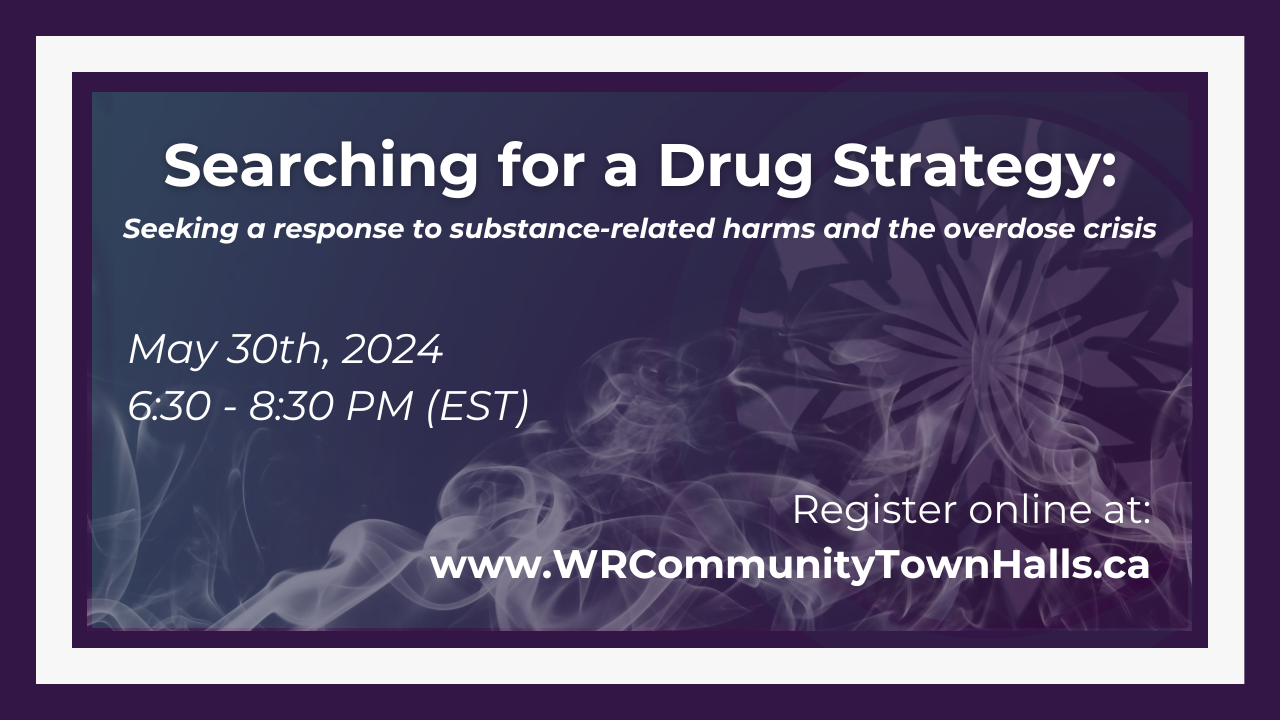For Immediate Release May 24, 2023:
Drug poisoning (overdose) continues to be a leading cause of acute death, with more than 626 people dying in Waterloo Region in the 5 year period 2018-2022. In the first 4 months of 2023, 36 people are suspected to have died from drug poisoning. Most of those overdose deaths, and those deaths certain to come throughout this year, are accidental and preventable. For context, 14 people died in motor vehicle collisions in all of 2022, a number which would be much higher if not for the robust 'Vision Zero' efforts in strategy development, law, policy, and funding that make Ontario one of the safest driving jurisdictions in North America.
The drug poisoning crisis is a public health emergency fuelled each day by a range of antiquated laws, policies, and funding arrangements that compromise the health, safety, and economic wellbeing of all residents. The crisis differs from other emergency responses by the near absence of urgent and proportional strategies across multiple levels of government. Since 2018, more than 16, 751 suspected drug poisoning deaths have occured in Ontario.
Cost-effective opportunities that improve health, safety, and wellbeing exist. Community-driven change has been a key feature of realizing some of those opportunities since the bootleg fentanyls overwhelmed the unregulated drug markets in 2015-16. In the face of political, government, and institutional inertia, and no indication that the unregulated market will become safer or healthier, advancing evidence-informed strategies and solutions may depend on the efforts of citizens, not for profit, and private sector interests.
On June 1st, from 6:30-8:30 PM, Regional Councillor Rob Deutschmann is set to host the third virtual segment of his local community engagement series. This virtual town hall titled, “The Drug Crisis in Waterloo Region - What we know; What is missing? Envisioning a way forward”, will include both expert speakers and time for participants to engage in discussion on this vital topic.
Quote From Event Host:
“I am pleased to be able to present an excellent line up of speakers for this important community discussion. They all have significant knowledge and experience, some lived, that they are willing to share at the townhall. It will be informative and it will be a good start to a community discussion that needs to occur as we continue to experience a growing drug crisis in our community.” - Regional Councillor Rob Deutschmann
The panel of expert speakers includes:
Register to receive the meeting link to attend via Zoom. Registration is free and available at www.WRCommunityTownHalls.ca. It is also available by emailing [email protected].
This series is recorded and once available, footage will be posted alongside additional topic information online. All hosted virtual segments in this series can be found at www.WRCommunityTownHalls.ca
Speaker Quotes:
“There is so much publicly-available data on issues related to the drug poisoning crisis in the Region. What is missing is a clear strategy and the political will to address the deadliest public health crisis of our time. We saw how swift governments responded to COVID-19, so where is the same level of urgency for the overdose epidemic?"
- Dr. Geoff Bardwell, Assistant Professor, School of Public Health Sciences at University of Waterloo
“Walk beside them through their whole journey.”
- Char Lee, Peer Outreach Worker and Community Advocate
“This community needs an integrated strategy to address the toxic drug crisis to prevent more unnecessary deaths. People from all walks of life are dying. Stigma is making a health crisis into a political minefield.”
- Kathy Moreland, RN, MScN, MOM
“Robust preventative and mitigating actions from entities with the mandates, protocols, and funding to protect public health and safety remain elusive for the worst drug poisoning crisis in Canadian history. Antiquated notions of who amongst us is worthy of prevention and protection fuel dangerous policy choices with little to no discernible public benefits. After 115 years of narcotic laws with scant evidence of health and safety benefits, there remains much political-structural enthusiasm for subsidizing and enforcing an unregulated, untaxed, unsafe, and unhealthy drug market known to kill and injure thousands of people annually, among a multitude of other human, environmental, public and private sector financial harms.
Community-led initiatives have historically been the source for life-saving initiatives in prevention, harm reduction and treatment. Significant opportunities still exist. Untethered from government and political inertia, communities can and should be supported to initiate authentic and innovative cost-effective collaborative strategies and solutions that improve both individual and community health and safety.”
- Michael Parkinson, Drug Strategies Specialist
Drug poisoning (overdose) continues to be a leading cause of acute death, with more than 626 people dying in Waterloo Region in the 5 year period 2018-2022. In the first 4 months of 2023, 36 people are suspected to have died from drug poisoning. Most of those overdose deaths, and those deaths certain to come throughout this year, are accidental and preventable. For context, 14 people died in motor vehicle collisions in all of 2022, a number which would be much higher if not for the robust 'Vision Zero' efforts in strategy development, law, policy, and funding that make Ontario one of the safest driving jurisdictions in North America.
The drug poisoning crisis is a public health emergency fuelled each day by a range of antiquated laws, policies, and funding arrangements that compromise the health, safety, and economic wellbeing of all residents. The crisis differs from other emergency responses by the near absence of urgent and proportional strategies across multiple levels of government. Since 2018, more than 16, 751 suspected drug poisoning deaths have occured in Ontario.
Cost-effective opportunities that improve health, safety, and wellbeing exist. Community-driven change has been a key feature of realizing some of those opportunities since the bootleg fentanyls overwhelmed the unregulated drug markets in 2015-16. In the face of political, government, and institutional inertia, and no indication that the unregulated market will become safer or healthier, advancing evidence-informed strategies and solutions may depend on the efforts of citizens, not for profit, and private sector interests.
On June 1st, from 6:30-8:30 PM, Regional Councillor Rob Deutschmann is set to host the third virtual segment of his local community engagement series. This virtual town hall titled, “The Drug Crisis in Waterloo Region - What we know; What is missing? Envisioning a way forward”, will include both expert speakers and time for participants to engage in discussion on this vital topic.
Quote From Event Host:
“I am pleased to be able to present an excellent line up of speakers for this important community discussion. They all have significant knowledge and experience, some lived, that they are willing to share at the townhall. It will be informative and it will be a good start to a community discussion that needs to occur as we continue to experience a growing drug crisis in our community.” - Regional Councillor Rob Deutschmann
The panel of expert speakers includes:
- Geoff Bardwell, Assistant Professor, School of Public Health Sciences at University of Waterloo
- Sara Escobar, Outreach Worker and co-founder of Peregrine Outreach Waterloo Region
- Char Lee, Peer Outreach Worker and Community Advocate
- Kathy Moreland, RN, MScN, MOM
- Michael Parkinson, Drug Strategies Specialist
Register to receive the meeting link to attend via Zoom. Registration is free and available at www.WRCommunityTownHalls.ca. It is also available by emailing [email protected].
This series is recorded and once available, footage will be posted alongside additional topic information online. All hosted virtual segments in this series can be found at www.WRCommunityTownHalls.ca
Speaker Quotes:
“There is so much publicly-available data on issues related to the drug poisoning crisis in the Region. What is missing is a clear strategy and the political will to address the deadliest public health crisis of our time. We saw how swift governments responded to COVID-19, so where is the same level of urgency for the overdose epidemic?"
- Dr. Geoff Bardwell, Assistant Professor, School of Public Health Sciences at University of Waterloo
“Walk beside them through their whole journey.”
- Char Lee, Peer Outreach Worker and Community Advocate
“This community needs an integrated strategy to address the toxic drug crisis to prevent more unnecessary deaths. People from all walks of life are dying. Stigma is making a health crisis into a political minefield.”
- Kathy Moreland, RN, MScN, MOM
“Robust preventative and mitigating actions from entities with the mandates, protocols, and funding to protect public health and safety remain elusive for the worst drug poisoning crisis in Canadian history. Antiquated notions of who amongst us is worthy of prevention and protection fuel dangerous policy choices with little to no discernible public benefits. After 115 years of narcotic laws with scant evidence of health and safety benefits, there remains much political-structural enthusiasm for subsidizing and enforcing an unregulated, untaxed, unsafe, and unhealthy drug market known to kill and injure thousands of people annually, among a multitude of other human, environmental, public and private sector financial harms.
Community-led initiatives have historically been the source for life-saving initiatives in prevention, harm reduction and treatment. Significant opportunities still exist. Untethered from government and political inertia, communities can and should be supported to initiate authentic and innovative cost-effective collaborative strategies and solutions that improve both individual and community health and safety.”
- Michael Parkinson, Drug Strategies Specialist
|
Online Information & Social Medias:
|
(Video is downloadable in full screen)
|
Images available for download/sharing:
Event Flyers:
|
|
| ||||||
Speakers:
|
|
| ||||||||||||
